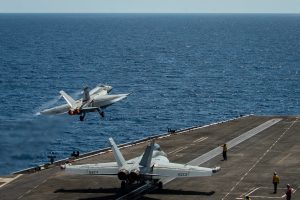The U.S. 7th Fleet announced on April 6 that the Theodore Roosevelt Carrier Strike Group had entered the South China Sea two days before, on April 4, to conduct “routine operations.” This would be the second time this year that the strike group – consisting of flag ship carrier USS Theodore Roosevelt, Carrier Air Wing 11, the Ticonderoga-class guided-missile cruiser USS Bunker Hill, Destroyer Squadron 23, and the Arleigh Burke-class guided-missile destroyer USS Russell – has entered that body of water as part of its tasking within the 7th Fleet’s area of operations.
According to the 7th Fleet statement, “While in the South China Sea, the strike group will conduct fixed and rotary-wing flight operations, maritime strike exercises, anti-submarine operations, coordinated tactical training, and more.”
“It is great to be back in the South China Sea to reassure our allies and partners that we remain committed to freedom of the seas,” the statement quoted Rear Admiral Doug Verissimo, commander, Carrier Strike Group Nine as saying.
“Over the course of the strike group’s deployment, we have demonstrated our commitment to the rules-based order in the Indo-Pacific region by operating with our friends from Australia, India, Japan, Malaysia and South Korea. We look forward to continuing to sail together with all those that embrace our collective vision of security and stability in one of the most important regions in the world,” Verissimo added in the statement.
The strike group had exercised with the Indian navy and air force in the Bay of Bengal at the end of March. According to a 7th Fleet statement on the occasion, the exercise focused on anti-submarine warfare, joint air operations, and command and control integration.
The Theodore Roosevelt’s return to the South China Sea comes amid growing regional tensions that – if left unchecked – threaten to boil over, as analysts continue to be apprehensive about China’s coercive posture toward Taiwan, and its use of maritime militia to enforce illegal claims in the South China Sea, most recently within the Philippines’ exclusive economic zone (EEZ).
Media reports suggest that a Chinese strike group around aircraft carrier Liaoning is now exercising in Taiwan’s vicinity. An April 6 Japan Times report quoted a People’s Liberation Army (PLA) Navy statement as saying that the purpose behind this “routine” exercise is to “enhance its capability to safeguard national sovereignty, safety and development interests,” going on to add that “[s]imilar exercises will be conducted on a regular basis in the future.”
According to the newspaper, Taiwan also reported a PLA Air Force incursion into its air defense identification zone on April 4.
Meanwhile, dozens of Chinese “shipping vessels” (44, by Manila’s count on April 3) still remain near the Whitsun Reef, a feature within the Philippines’ EEZ in the Spratly Islands in the South China Sea. While China claims that these ships are commercial vessels stuck there due to inclement weather, the United States and the Philippines – as well as international analysts — maintain that they form part of China’s maritime militia tasked with incrementally enforcing the country’s expansive maritime claims without triggering military retaliation.
According to a White House readout of a call between U.S. National Security Advisor Jake Sullivan and Philippine National Security Advisor Hermogenes Esperon on March 31, the two discussed the Whitsun Reef events, with Sullivan reaffirming “the applicability of the U.S.-Philippines Mutual Defense Treaty in the South China Sea.”
On April 1, the Philippines claimed to have discovered illegal constructed structures on the Union Banks, a collection of reefs in the Spratlys that include the Whitsun Reef, while conducting maritime patrols. Manila has not provided further details about the locations of these structures which, if independently confirmed, are likely to have been erected at the behest of China to further its territorial claims.
































